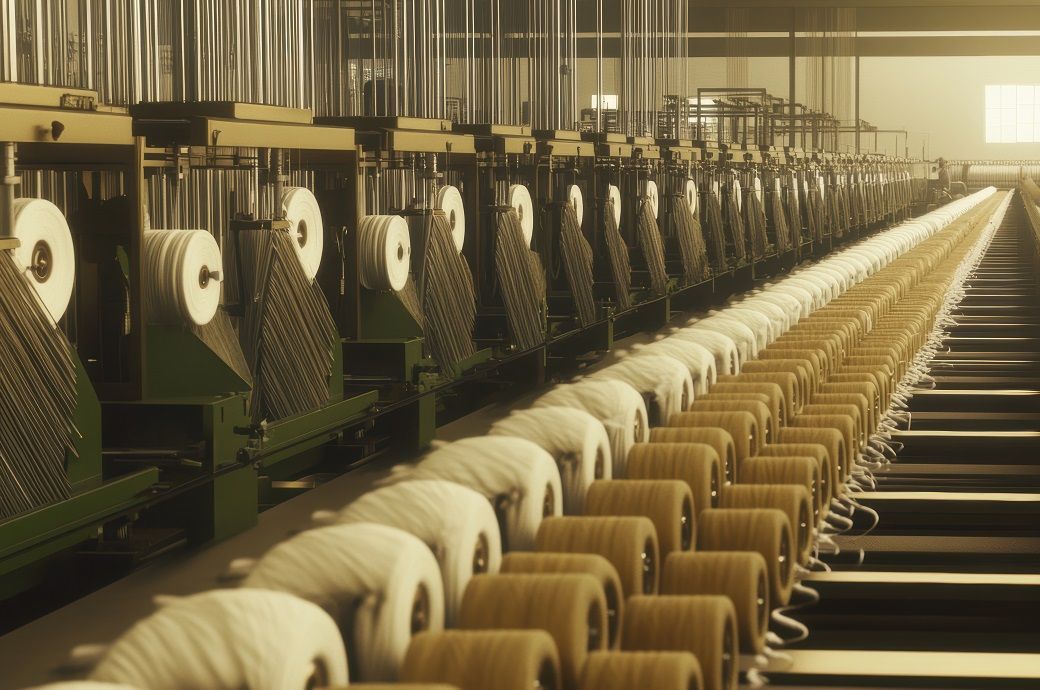
In Ludhiana, demand was lower as mills refrained from fresh buying due to lower cotton prices, with buyers anticipating a further decline. A trader from the Ludhiana market told Fibre2Fashion, “Spinning mills are facing headwinds in the cotton yarn export market due to price disparities. India’s traditional buyer, Bangladesh, is also encountering various issues, including payment problems, which affect the placement of orders for cotton yarn imports. Mills are hesitant to export to Bangladeshi buyers due to concerns about timely payments. Domestic cotton yarn demand is also below average.”
In Ludhiana, 30 count cotton combed yarn was sold at ₹257-267 (approximately $3.03-3.15) per kg (inclusive of GST); 20 and 25 count combed yarn were traded at ₹247-257 (approximately $2.92-3.03) per kg and ₹252-262 (approximately $2.97-3.09) per kg, respectively; and carded yarn of 30 count was noted at ₹237-242 (approximately $2.80-2.86) per kg today, according to trade sources.
The Delhi market also witnessed a similar trend. Cotton yarn was traded at the previous levels. According to market sources, demand during the summer season remains slow. Exports of cotton yarn and fabric are also below average. Indian mills are facing price disparities due to the high cost of domestic cotton.
In Delhi, 30 count combed knitting yarn was traded at ₹260-262 (approximately $3.07-3.09) per kg (GST extra), 40 count combed at ₹282-290 (approximately $3.33-3.42) per kg, 30 count carded at ₹237-239 (approximately $2.80-2.82) per kg, and 40 count carded at ₹262-265 (approximately $3.09-3.13) per kg today.
India’s home textile hub, Panipat, also experienced lower demand from the home furnishing value chain. However, demand from the garment industry compensated for this to some extent. Traders mentioned that demand from the downstream industry is very weak. Mills and traders are trying to hold prices at current levels. As a result, most recycled PC yarn varieties and counts traded at the previous levels, but cotton comber gained ₹4-5 per kg in the last few days. Traders noted that there is buzz about higher export demand from foreign markets.
In Panipat, 10s recycled PC yarn (Grey) was traded at ₹78-82 (approximately $0.92-0.97) per kg (GST paid). Other varieties and counts were noted at 10s recycled PC yarn (Black) at ₹53-56 (approximately $0.63-0.66) per kg, 20s recycled PC yarn (Grey) at ₹96-102 (approximately 1.14-1.21) per kg and 30s recycled PC yarn (Grey) at ₹130-135 (approximately $1.53-1.59) per kg. Cotton comber was noted at ₹100-110 (approximately $1.18-1.20) per kg and recycled polyester fibre (PET bottle fibre) at ₹78-80 (approximately $0.95-0.97) per kg today.
In North India, cotton prices further dropped by ₹30-40 per maund of 37.2 kg as the market saw slow demand from spinning mills. The higher supply and limited procurement by the Cotton Corporation of India (CCI) also contributed to the bearish trade. Traders mentioned that spinning mills had imported cotton in large quantities due to a price drop in the global market. CCI is also purchasing just 20-25 per cent of the cotton that has arrived in the market. Limited buying by the government agency caused a decline in seed cotton prices, which fell below the minimum support price.
North India's cotton arrival was 22,000 bales of 170 kg, comprising 1,500 bales in Punjab, 6,500 bales in Haryana, 7,000 bales in upper Rajasthan, and 7,000 bales in lower Rajasthan. Cotton prices in Punjab ranged from ₹5,550-₹5,570 (approximately $65.97-66.21) per maund of 37.2 kg, while in Haryana, prices ranged from ₹5,550-₹5,560 (approximately $65.85-65.97). In upper Rajasthan, cotton was priced between ₹5,550-₹5,570 (approximately $65.97-66.21) per maund. In lower Rajasthan, it was priced at ₹52,800-₹52,800 (approximately $629.04-640.84) per candy of 356 kg. Seed cotton was priced at ₹7,000-7,400 (approximately $83.79-88.51) per quintal of 100 kg.
ALCHEMPro News Desk (KUL)
Receive daily prices and market insights straight to your inbox. Subscribe to AlchemPro Weekly!